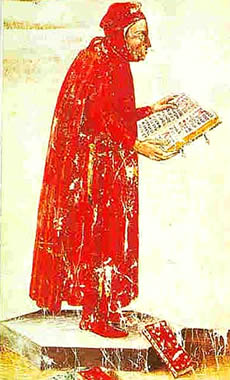 |
| Coluccio Salutati |
Access to Petrarch’s works at Rome strengthened Salutati’s study of antiquity and influenced the nature of his humanism. In 1375, he was appointed to the post of chancellor of the Republic of Florence, a position he held until his death in 1406.
As chancellor, Salutati was responsible for the official correspondence of the republic. He was recognized in his own lifetime for the persuasive power of his rhetoric and for his ability to utilize examples from the literature and history of ancient Rome to bolster support for Florence in its conflicts with the papacy and the Visconti rulers of Milan.
Salutati identified Florence as the defender of liberty, praised it for its republican institutions, and traced its origins to republican Rome. In doing so, he laid the groundwork for the laudatory writings of Leonardo Bruni and other Florentine humanists.
In his public career Salutati demonstrated that it was possible for a humanist to combine a scholarly interest in antiquity with the pursuit of a civic career. He firmly believed that the scholar had an obligation to use his knowledge for the benefit of society. Salutati encouraged budding humanists and opened his library to them.
Although his knowledge of Greek was minimal, he encouraged its study and was instrumental in inducing Manuel Chrysoloras, a Byzantine scholar from Constantinople, to institute Greek studies in Florence.
In a controversy over the use of pagan literature in the grammar schools of Florence, he sided with the humanist innovators in opposition to the traditionalists, but with a strong caveat that pagan literature should only be used to bolster Christian belief.
Salutati’s writings demonstrate that his humanism was, like that of his idol Petrarch, a blend of pagan ethics and Christian piety. However he did not have Petrarch’s aversion to Scholastic thought.
Several of Salutati’s treatises are worthy of mention. On the Secular and the Religious contrasts the active life with the monastic and makes a strong case for the latter.
On Fate and Fortune focuses on God’s providence, free will, and chance. On Shame examines whether shame is a virtue or a vice. On the Nobility of Law and Medicine favors law over medicine and the active life over the contemplative.
The controversial On Tyranny makes a strong case for monarchy in certain circumstances. In his last years, Salutati was working on his unfinished On the Labors of Hercules, a work that stresses the allegorical use of pagan poetry for Christian purposes. Salutati also wrote poetry in Latin and in Italian vernacular.
His private letters were often consolatory, advisory, and even remonstrative. Eulogized when he died, Salutati continues to be revered in Italy for his achievements and for his making Florence the locus of humanism.
EmoticonEmoticon